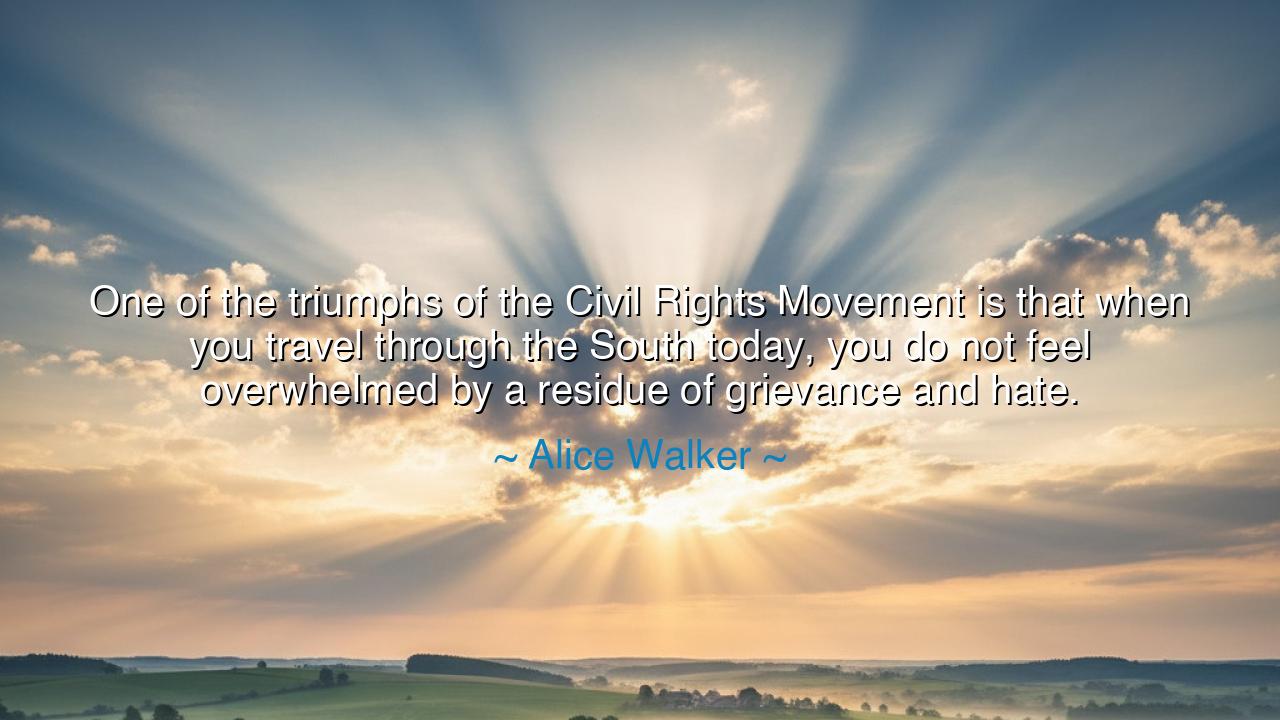
One of the triumphs of the Civil Rights Movement is that when
One of the triumphs of the Civil Rights Movement is that when you travel through the South today, you do not feel overwhelmed by a residue of grievance and hate.






Hear, O seeker of wisdom, the words of Alice Walker, daughter of the South and witness to its wounds: “One of the triumphs of the Civil Rights Movement is that when you travel through the South today, you do not feel overwhelmed by a residue of grievance and hate.” These words are both a remembrance and a celebration. They remind us of the abyss from which a people rose, and of the healing that followed. They are not a denial of past suffering, but an honoring of a victory hard-won: the victory of a spirit that refused to remain chained by bitterness.
The essence of this teaching is that healing is possible, even where hatred has burned longest. The American South was once a land heavy with the weight of injustice—where the memory of slavery lingered like a scar, where segregation ruled with iron laws, and where the struggle for dignity demanded blood and sacrifice. In such a place, it would have been easy for the future to be poisoned by the past, for grievance to become eternal, and for hate to perpetuate itself without end. Yet Walker tells us that one of the greatest achievements of the Civil Rights Movement was the transformation of that inheritance: turning grief into resilience, and anger into progress.
History itself confirms her words. In the marches of Selma, in the cries of children at Little Rock, in the sermons of Martin Luther King Jr., and in the defiance of Rosa Parks, the South trembled with conflict. Fire hoses, police dogs, and jeering crowds revealed the depth of hate that once reigned. Yet from these trials arose not only laws changed, but hearts softened. Slowly, through courage and endurance, the heavy residue of grievance was washed away—not erased, but cleansed enough that new generations could walk their streets without being crushed by ancient animosities.
This is no small triumph. For throughout history, many lands scarred by violence have remained chained to cycles of vengeance. Consider the endless feuds of clans in the Scottish Highlands, or the bitter conflicts of sectarian strife in Northern Ireland, or even the ancient vendettas of Mediterranean families—where grievance passed down like inheritance, poisoning the blood of each generation. The South could easily have become such a place, its soil forever bitter with hate. But because of the vision and sacrifice of the Civil Rights Movement, it became instead a land of resilience, where hope could breathe again.
Walker’s words also remind us of the power of forgiveness—not as weakness, but as strength. To refuse to be “overwhelmed” by hate is not to forget injustice, but to transcend it. The Civil Rights Movement was not only a struggle for rights, but a struggle for the soul of the nation, proving that love and justice can build what bitterness would destroy. This triumph was not merely political but spiritual, for it ensured that the children of the South could inherit not a poisoned well, but a renewed spring.
Yet let us not grow complacent. To say that hate no longer overwhelms is not to say it has vanished. Walker’s words must be heard as both praise and warning. The triumph of the past must be continually guarded in the present. For injustice is like a weed: if not watched, it grows back, sometimes subtly, sometimes fiercely. To travel the South today without being crushed by grievance is a gift won by sacrifice, but it is also a responsibility—to nurture, to protect, and to deepen that fragile peace.
The lesson, then, is this: struggles for justice can heal nations, if they are fought with courage and sustained with love. From the Civil Rights Movement, we learn that hatred does not need to define the future, even when it has scarred the past. In practice, this means remembering history truthfully, honoring the sacrifices of those who fought, and choosing in our daily lives to resist grievance and bitterness. Each act of respect, each pursuit of fairness, each refusal to perpetuate division, is part of the continuing work of reconciliation.
Thus, O listener, take this teaching to heart: when you walk through places once torn by injustice, remember the triumph of those who transformed hate into hope. And in your own life, when grievance tempts you to bitterness, recall that the true victory is not only to fight injustice, but to rise above it. For the soul of a people is not preserved by hate, but by the hard, heroic labor of forgiveness, justice, and love. This is the legacy of the Civil Rights Movement, and it is the path we must all continue to walk.






AAdministratorAdministrator
Welcome, honored guests. Please leave a comment, we will respond soon